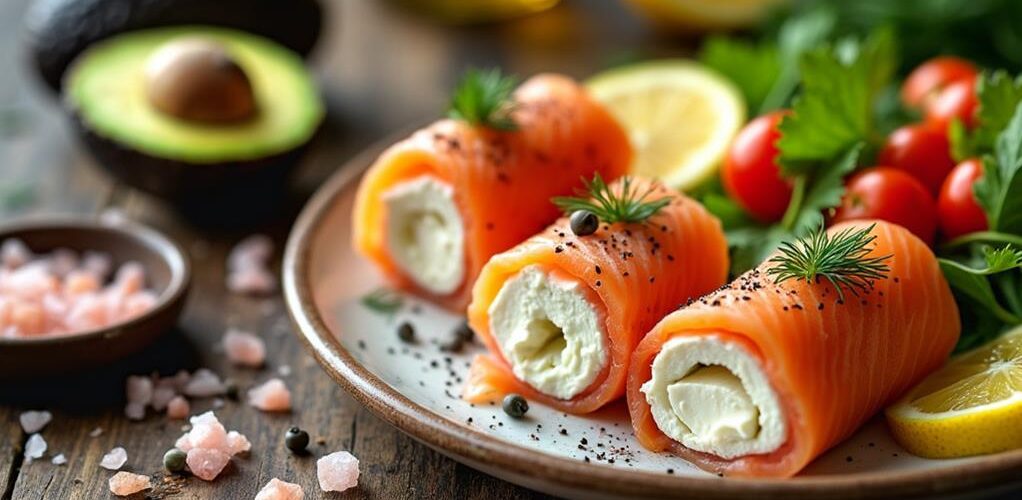
Incorporating more fat into your keto diet can be efficiently achieved through various methods grounded in nutritional science. Start with fat bombs, which often include coconut oil and nut butters, to boost fat intake quickly. Bulletproof coffee made with grass-fed butter and MCT oil is another excellent option. Utilize full-fat dairy products such as heavy cream and soft cheeses for meals. Adding avocado provides healthy monounsaturated fats. Nuts like macadamia and walnuts offer nutrient-dense options. Cook with oils rich in healthy fats, such as olive or avocado oil. Finally, use high-fat dips like guacamole or hummus to enrich snacks. Discover additional insights to optimize your keto journey.
Key Takeaways
- Incorporate fat bombs made with coconut oil or nut butters for quick, high-fat snacks.
- Blend Bulletproof Coffee with grass-fed butter and MCT oil for a fat-rich morning boost.
- Add heavy cream or full-fat Greek yogurt to smoothies for increased fat content and creaminess.
- Snack on nutrient-dense nuts like macadamias and pecans for healthy fats.
- Use healthy cooking oils such as olive oil and avocado oil to enhance meals with essential fats.
Incorporate Fat Bombs
Incorporating fat bombs into your ketogenic diet can be a strategic way to meet your daily fat intake goals while maintaining low carbohydrate levels. Fat bombs are high-fat, low-carb snacks, often comprising ingredients such as coconut oil, nut butters, cream cheese, and cocoa powder. These components not only facilitate a variety of flavor variations but also guarantee that the snacks remain rich in fat content, with typical fat bombs containing 70 to 90% of their calories from fat.
Additionally, fat bombs can provide quick energy and help in promoting satiety, making them an excellent choice for those needing an energy boost without a blood sugar spike.
The preparation methods for fat bombs are straightforward, typically requiring just a few ingredients and minimal prep time. This simplicity makes them an ideal choice for those with busy lifestyles who need quick, convenient snack options. For instance, one might blend coconut oil with cocoa powder and a sweetener, then refrigerate the mixture until solid, creating a chocolate-flavored fat bomb.
In addition to their ease of preparation, fat bombs are effective in enhancing satiety and curbing cravings. This can greatly aid in adhering to the ketogenic diet by preventing deviations from the desired macronutrient ratios.
Enjoy Bulletproof Coffee
Building on the convenience and nutritional benefits of fat bombs, another excellent strategy to enhance your ketogenic diet is by enjoying Bulletproof Coffee. This keto coffee is created by blending brewed coffee with grass-fed butter and medium-chain triglyceride (MCT) oil, resulting in a creamy beverage that greatly boosts your intake of healthy fats while providing sustained energy.
You can also explore top keto-friendly coffee creamers, such as Left Coast Keto Creamer or Grasso Foods Coffee Booster, for additional variety.
Incorporating Bulletproof Coffee into your morning routine can be particularly beneficial. The combination of healthy fats, primarily from MCT oil, aids in promoting ketosis, as MCTs are rapidly metabolized into ketones, which serve as an efficient fuel source for the brain and body.
A typical serving of this keto coffee delivers around 30-50 grams of fat, contributing considerably to the recommended daily fat intake of 70-80% on a ketogenic diet.
Additionally, consuming Bulletproof Coffee in the morning can help reduce hunger and cravings throughout the day, thereby supporting adherence to a low-carb lifestyle.
For ideal health benefits, use high-quality coffee beans and confirm that the butter is unsalted and derived from grass-fed sources. Mastering the blending techniques is key to achieving a smooth, well-emulsified beverage that can seamlessly fit into your ketogenic regimen.
Use Full-fat Dairy
Incorporating full-fat dairy products such as whole milk, heavy cream, and full-fat yogurt can greatly aid in meeting the high-fat requirements of a ketogenic diet.
These high-fat options not only enhance the flavor and satiety of meals but also guarantee you stay within the desired macronutrient ratios for ketosis.
Additionally, using full-fat dairy in smoothies or cooking with heavy cream can add nutritional value and variety to your keto regimen.
For instance, soft cheeses like Brie and mascarpone can enhance the richness of your meals, while products like whipping cream are ideal for desserts and coffee.
High-fat Dairy Options
Full-fat dairy products are an excellent addition to a ketogenic diet, providing a concentrated source of healthy fats essential for maintaining ketosis.
When considering high-fat dairy options, cream cheese stands out as a versatile and nutrient-dense choice. With approximately 8 grams of fat per ounce, it adds a creamy texture and richness to both sweet and savory dishes, making it a valuable ingredient in a keto-friendly kitchen.
Cheese varieties such as cheddar and mozzarella are also remarkable for their high-fat content, containing about 9 grams of fat per ounce. These cheeses not only contribute to your daily fat intake but also provide a substantial amount of protein, supporting muscle maintenance and overall health.
Heavy cream and full-fat yogurt are additional excellent options. Heavy cream delivers roughly 5 grams of fat per tablespoon, making it an easy way to enrich sauces, soups, and beverages.
Full-fat Greek yogurt, with around 10 grams of fat per 150-gram serving, offers the added benefit of probiotics, promoting gut health.
Lastly, selecting whole milk instead of skim can meaningfully increase your fat intake, with whole milk providing about 8 grams of fat per cup, compared to only 2.5 grams in skim milk.
Smoothies With Full-Fat Dairy
For those following a ketogenic diet, adding smoothies enriched with full-fat dairy can be a strategic approach to enhance fat intake while delivering essential nutrients. Incorporating full-fat dairy, such as heavy cream or full-fat Greek yogurt, into smoothie recipes can greatly boost fat content and create a creamy texture that is both satisfying and nutritious.
A typical serving of heavy cream contains about 5.5 grams of fat per tablespoon, making it an excellent choice for those looking to increase their fat intake. Similarly, full-fat Greek yogurt not only adds approximately 10 grams of fat per 100 grams but also provides probiotics that support gut health. These benefits contribute to a more balanced and nutrient-dense smoothie, which is essential for maintaining energy levels and satiety throughout the day.
In addition to their high-fat content, full-fat dairy options offer a rich and satisfying taste, helping to curb cravings for high-carb snacks. Blending these ingredients with low-carb fruits like berries or avocados can create delicious and keto-friendly smoothies.
For those seeking dairy alternatives, options like coconut cream or almond milk can also be incorporated, although they may slightly alter the fat content and texture.
Cooking With Heavy Cream
Smoothies enriched with full-fat dairy can be a delicious and effective way to increase fat intake within a ketogenic diet, but another versatile method involves cooking with heavy cream. Heavy cream contains about 5 grams of fat per tablespoon, making it an excellent source of healthy fats.
One of the primary heavy cream benefits is its richness in fat-soluble vitamins A, D, E, and K, which are essential for overall health and nutrient absorption.
Incorporating heavy cream into recipes can greatly enhance both flavor and texture. Heavy cream recipes such as creamy sauces, soups, and low-carb desserts align well with keto macronutrient goals, ensuring that your diet remains both enjoyable and effective.
Additionally, heavy cream can be whipped to create a delicious topping for low-carb desserts, offering a satisfying indulgence while maintaining high-fat content.
Using heavy cream in cooking can help meet the recommended 70-80% of calories from fat necessary for maintaining ketosis. The versatility of heavy cream allows for its inclusion in a wide array of dishes, making it a valuable component in a ketogenic dietary regimen.
This approach not only boosts fat intake but also enriches the culinary experience.
Add Avocado to Meals
Regularly incorporating avocado into your meals can greatly enhance the nutritional profile of a ketogenic diet. Avocado benefits are numerous, primarily due to its rich content of monounsaturated fats, providing approximately 15 grams of healthy fat per medium avocado. This aligns well with the high-fat requirements of a keto diet.
Additionally, avocados contain around 3 grams of net carbs and 9 grams of fiber, which aids in satiety without greatly impacting carbohydrate intake. Avocados are also packed with essential nutrients such as vitamin E and potassium, contributing to overall health and wellness. For instance, adding avocado to salads or smoothies can improve both the taste and texture while boosting the fat content.
Avocados can also be mashed and used as a spread on low-carb bread, offering a creamy and nutritious alternative to traditional spreads.
Moreover, each avocado provides about 975 mg of potassium, an essential electrolyte that is particularly vital for those on a ketogenic diet to help maintain electrolyte balance.
Utilizing avocado oil in cooking or as a salad dressing can further increase healthy fat intake, with each tablespoon containing around 14 grams of fat and no carbohydrates.
Snack on Nuts
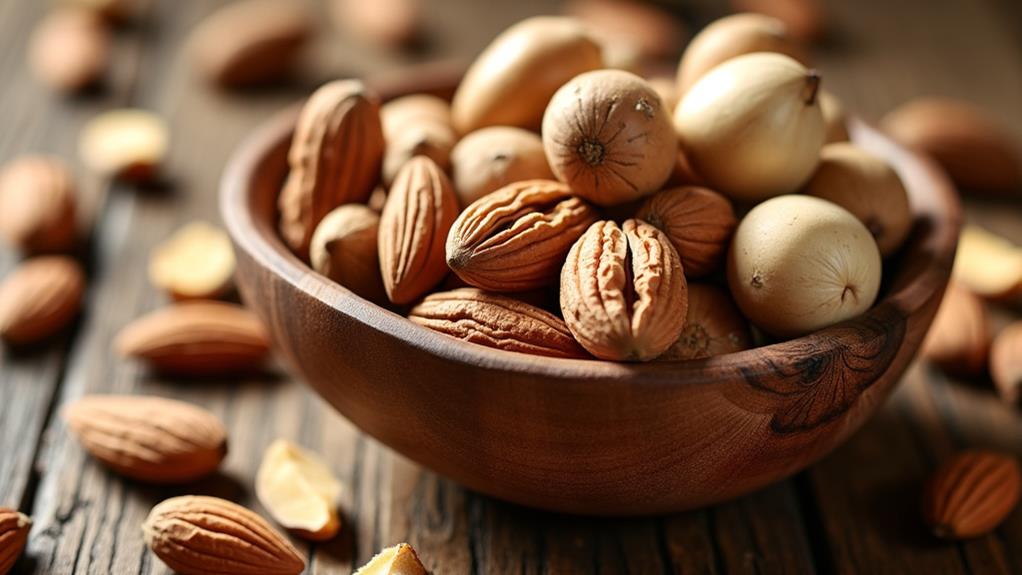
Nuts are a nutrient-dense choice for snacking on a keto diet, offering a rich source of healthy fats and essential nutrients.
Nuts like almonds, walnuts, and pecans are also good sources of Omega-3 fatty acids, which support mental clarity and heart health.
However, due to their high caloric content, it is important to practice portion control, with a typical serving size being about one ounce.
Incorporating nuts can not only enhance satiety but also contribute to heart and brain health.
Nutrient-Dense Choices
Incorporating nutrient-dense snacks into your keto diet can greatly enhance your nutritional profile, and nuts are an exemplary choice. Various nut varieties, such as almonds, walnuts, macadamia nuts, and pecans, provide a nutrient balance that is ideal for maintaining ketosis.
For instance, almonds contain approximately 14 grams of fat per ounce, with walnuts offering around 18 grams of fat per ounce. These fats are primarily heart-healthy monounsaturated and polyunsaturated fats, which support cardiovascular health.
Moreover, nuts are rich in protein and fiber, contributing to increased satiety and potentially reducing overall calorie intake. This makes them a practical option for those aiming to manage their weight while adhering to a ketogenic diet.
Macadamia nuts and pecans are particularly high in fat, with around 21 grams and 20 grams of fat per ounce, respectively, making them excellent choices for meeting daily fat intake goals.
Additionally, nuts are abundant in essential vitamins and minerals, such as vitamin E, magnesium, and selenium. These micronutrients play significant roles in metabolic functions and overall health.
Portion Control
While nutrient-dense snacks like nuts offer numerous benefits for those following a keto diet, it is equally important to practice mindful portion control to optimize these advantages. Nuts are rich in healthy fats, making them an excellent choice for increasing fat intake.
For instance, a 1-ounce serving of almonds contains approximately 14 grams of fat, while walnuts provide about 18 grams of fat and 4 grams of protein per ounce. However, to maximize these benefits, it is essential to focus on appropriate nut selection and serving sizes.
Choosing unsalted and unprocessed nuts helps avoid added sugars and unhealthy fats, ensuring that your snacks align with the low-carb requirements of a ketogenic diet. To manage calorie intake effectively and meet your fat goals, consider pre-portioning nuts into 1-ounce servings.
- Nut Selection: Opt for unsalted, unprocessed varieties.
- Serving Sizes: Pre-portion nuts into 1-ounce servings to prevent overconsumption.
- Balanced Nutrition: Incorporate nuts for their healthy fats, protein, and fiber.
Evidence suggests that regular nut consumption is linked to lower body weight and improved heart health, further supporting their inclusion in a balanced ketogenic diet.
Cook With Healthy Oils
Cooking with healthy oils is a cornerstone of the keto diet, providing essential fats that not only enhance flavor but also offer numerous health benefits. High-quality oils such as olive oil and avocado oil are rich in monounsaturated fats, which have been linked to improved heart health and reduced inflammation. These oils can be utilized in a variety of cooking techniques, including sautéing, roasting, and dressing salads, thereby maximizing their oil benefits.
Coconut oil is another excellent choice for keto enthusiasts as it contains medium-chain triglycerides (MCTs), which may aid in weight loss and provide a quick energy source. MCT oil from coconut oil can also improve brain health and stabilize blood sugar levels. Incorporating coconut oil into your cooking can be particularly effective for frying and baking, due to its high smoke point and unique flavor profile.
For a boost in omega-3 fatty acids, consider using flaxseed oil or walnut oil. These oils support brain health and reduce inflammation, making them ideal for cold applications like salad dressings or drizzling over prepared dishes.
Additionally, butter and ghee are valuable for their saturated fats and essential vitamins. They are perfect for sautéing and baking, offering both flavor enhancement and nutritional benefits.
Experiment with nut oils like macadamia or hazelnut oil for unique flavors in dressings and marinades.
Use High-fat Dips
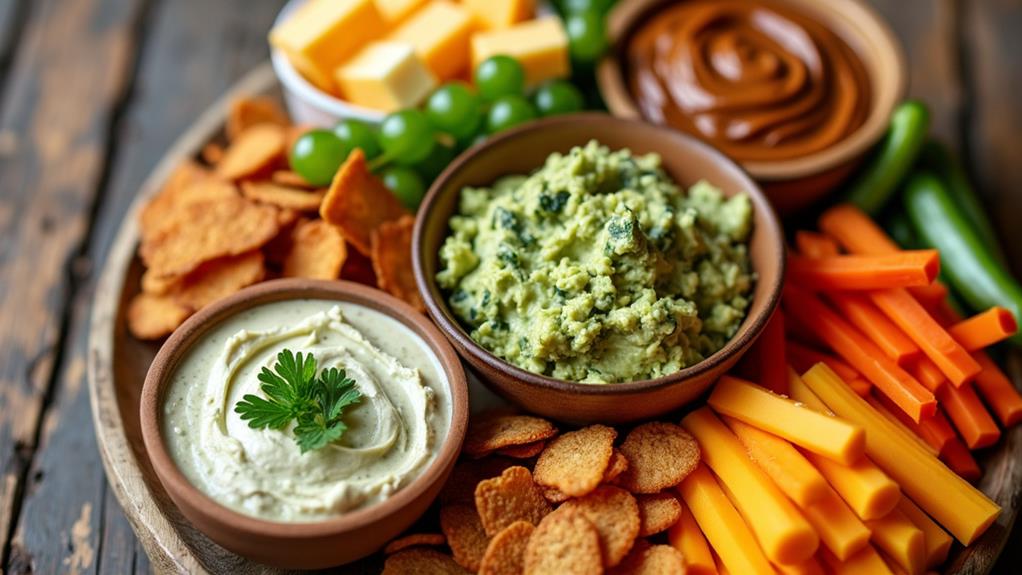
Enhance your keto experience by integrating high-fat dips into your diet, improving both nutrition and satiety. High-fat dips, such as guacamole made from avocados, are a rich source of monounsaturated fats that benefit heart health while enhancing satiety.
Including creamy dips made with full-fat Greek yogurt or sour cream can add both healthy fats and probiotics, supporting gut health essential on a keto diet. Nut butter dips, such as those made from almond or peanut butter, provide significant amounts of healthy fats and protein.
These dips are perfect for snacking with low-carb vegetables, guaranteeing you stay within your carbohydrate limits while boosting your fat intake. Hummus, made from tahini and olive oil, is another high-fat dip option that offers unsaturated fats and fiber, promoting fullness and aiding digestion.
Consider these high-fat dip options for your keto diet:
- Guacamole: Rich in monounsaturated fats and fiber.
- Probiotic dips: Made with full-fat Greek yogurt or sour cream, adding beneficial probiotics.
- Nut butter dips: Almond or peanut butter dips provide healthy fats and protein.
Incorporating these dips into your meals not only diversifies your diet but also guarantees you meet your fat intake goals with nutrient-dense options.
Frequently Asked Questions
How to Do a Fat Fast on Keto?
To implement a fat fast on keto, consume 1,000-1,200 calories daily with 85-90% from fat. Limit the fat fast duration to 3-5 days. Monitoring for fatigue and digestive issues guarantees you reap the fat fast benefits effectively.
How to Increase Fat on a Keto Diet?
To increase fat on a keto diet, incorporate high-fat sources such as avocados, nuts, and seeds into your meal planning. Utilize cooking methods like sautéing with olive oil and consider adding MCT oil or heavy cream to beverages.
What if I Don't Get Enough Fat on Keto?
Insufficient fat intake on a keto diet can lead to fat deficiency, negatively impacting keto adaptation. This may result in increased hunger, low energy levels, and impaired ketosis, ultimately hindering weight loss and metabolic stability.
What Foods Are High in Fat for Keto?
Foods high in fat for keto include fatty fish, avocado benefits, cheese varieties, nut options, coconut oil, and olive oil. These sources provide healthy fats, essential nutrients, and support ketosis efficiently, promoting overall health and well-being.
Conclusion
In summary, the incorporation of fat bombs, Bulletproof coffee, full-fat dairy, avocados, nuts, healthy oils, and high-fat dips can greatly enhance the fat content of a ketogenic diet. These strategies not only guarantee adherence to the macronutrient ratios essential for ketosis but also contribute to overall nutritional balance. By carefully selecting and integrating these high-fat foods, individuals can optimize their ketogenic dietary regimen for improved metabolic health and sustained energy levels.

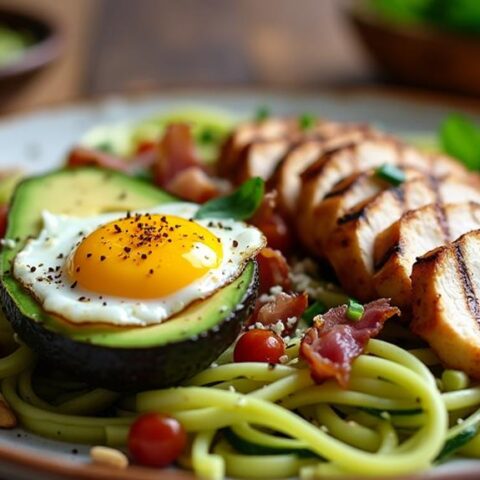
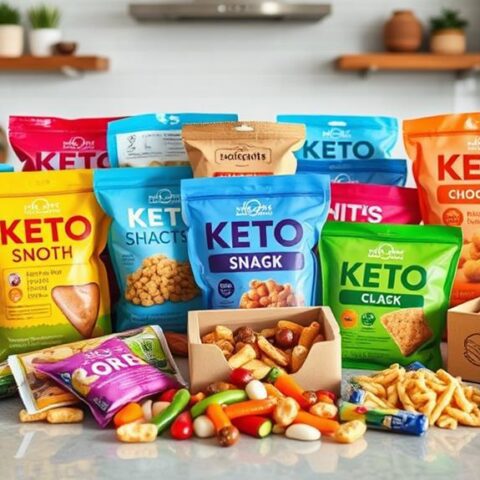
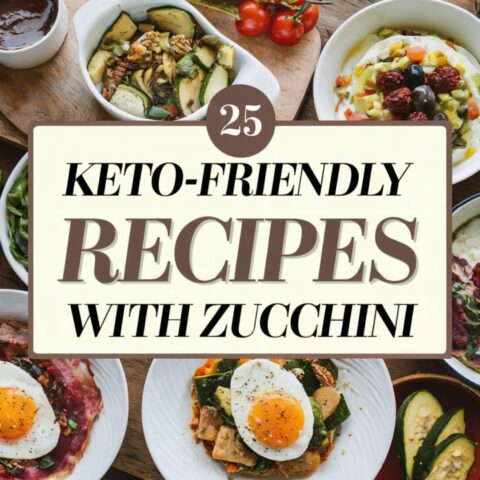
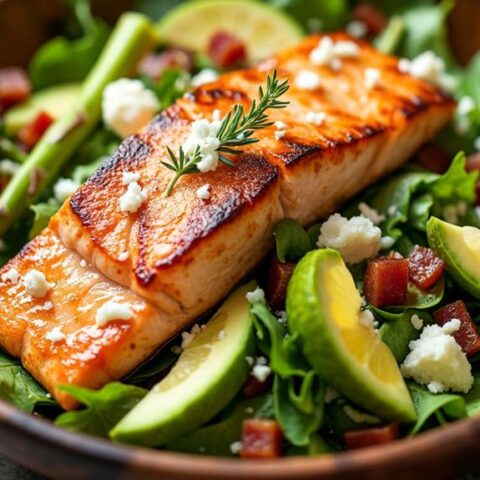





No Comments